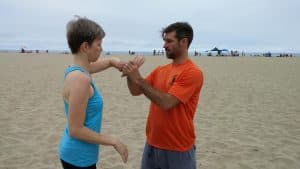We don’t use the word “opponent” in our school. In fact, the only time I say it is when a brand new student asks me, “What if your opponent…” and I use it as an opportunity to talk about this concept.
We endeavor to treat everybody as partners. All of the students in the school are our partners. Everyone in our family are our partners. Our boss is our partner. The insanely slow clerk at the DMV, the IRS and the quarterback of the other football team are our partners.
This isn’t just semantics, however the distinction in language is helpful for us. Calling someone a partner elicits thoughts and feelings of connectedness and comradery, while the word opponent leaves us with a feeling of hostility, aggression and bitterness. For me, the word opponent just feels wrong. It’s more than just that though. To really think of and treat everyone as a partner, not an opponent is a fundamental paradigm shift. This shift causes us to be more productive, less stressed and overall happier human beings.
In the dojo, we are constantly provided with opportunities to work on this. In T’ai Chi, when we practice push hands, it’s so tempting and easy to fall into the cycle of thought concerning victory and defeat. We think, I just got pushed twice, so I better not let her push me again! or, I’ve been practicing longer, I better show this guy how good I am! Notice how these thoughts are really about us, not the other person? It’s the focus on ourselves rather than our partner’s experience which causes us to act more like opponents (even typing the word feels wrong).
In sparring during Kung Fu, when we get hit, most of us get momentarily upset, either with ourselves or the other student. If we successfully side-step our partner’s strike or hit them back, we feel the ego gratification. Yet if we truly practice as partners, we feel the same no matter who gets hit. We can even delight in our partner’s success. Both partners succeed in sparring together. It’s more like dancing (who tries to beat their partner at the Tango?) than fighting.



